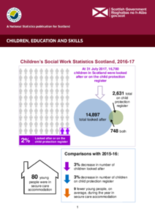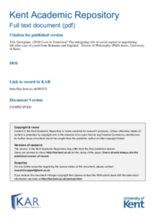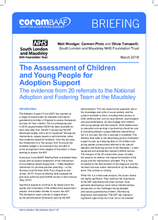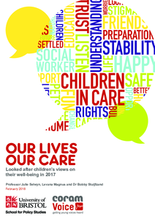Displaying 811 - 820 of 1177
This review explored the conceptualization, operationalization and measurement of resilience in children and adolescents living in residential care settings.
This report from the Scottish government presents the latest data on children and young people looked after, on the child protection register and in secure care.
This study examined care leavers' own safety net and how they negotiate independent living, aimed at understanding strategies used to negotiate independent living through the lenses of social capital and social networks.
This paper provides an overview of neglect as a phenomenon and explores some of these challenges for and to practice.
This Briefing Note adds to the developing picture of adoption support issues by analysing data on 20 children and young people consecutively referred to the special adoption and fostering service at the Maudsley – a wellrespected and established national CAMHS service.
This paper presents findings from two studies, in England (2012) and Ireland (2013), which explored experiences of unaccompanied refugee minors (URM) in foster care.
This article from the Guardian describes the lack of support that many kinship carers in the UK experience.
This paper examines the longer term outcomes of young people who experienced out of home care (OHC) as children, in Britain, Germany and Finland, countries characterised by different welfare regimes.
This report from the University of Bristol School for Poicy Studies and Coram Voice presents findings from a 2017 survey, in which 2,263 looked after children and young people from 16 local authorities in the United Kingdom completed the ‘Your Life, Your Care’ survey to determine their subjective, self-reported wellbeing.
This chapter raises questions about the use of unregulated websites and the commodification of children that seek forever families, how far adoption in the digital age will be further redefined remains to be seen.




